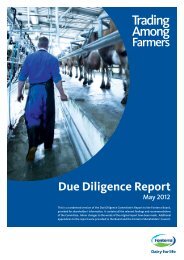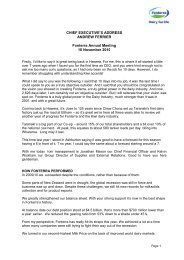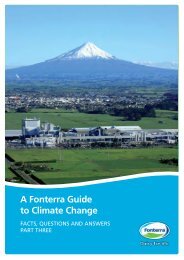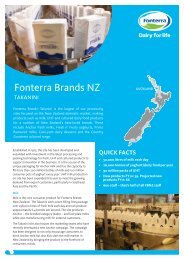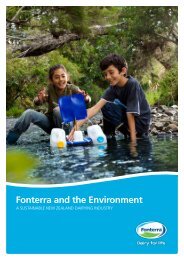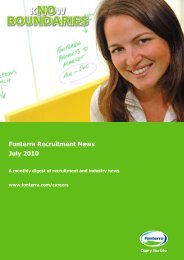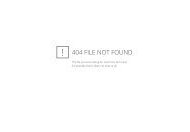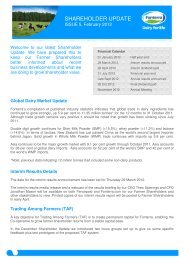Prospectus - Fonterra
Prospectus - Fonterra
Prospectus - Fonterra
You also want an ePaper? Increase the reach of your titles
YUMPU automatically turns print PDFs into web optimized ePapers that Google loves.
<strong>Fonterra</strong> Co-operative Group LimitedStatement of significant accounting policiesFor the 14 months ended 31 July 200838s) Finance income and costsFinance income comprises interest income on funds on deposit. Interest income is recognised as it accrues usingthe effective interest method.Finance costs comprise interest expense on borrowings, unwinding of the discount on provisions, gains andlosses on the revaluation of debt hedges and the hedged risks on certain debt instruments, and gains and lossesrelating to forward points on forward exchange contracts. Interest expense and the unwinding of the discount onprovisions are recognised in the income statement using the effective interest method. Borrowing costs directlyattributable to the acquisition, construction or production of a qualifying asset are capitalised as part of the cost ofthat asset.t) TaxationTax expense comprises current and deferred tax. Tax expense is recognised in the income statement except tothe extent that it relates to items recognised directly in equity, in which case it is recognised in equity.Current tax is the expected tax payable or receivable on the taxable income or loss for the period, using tax ratesenacted or substantively enacted at the reporting date, and any adjustment to tax payable or receivable in respectof previous years.Deferred tax is recognised, using the balance sheet method, on temporary differences arising between the taxbases of assets and liabilities and their carrying amounts in the financial statements. Deferred tax is measured atthe tax rate that is expected to apply to the temporary differences when they reverse, based on laws that havebeen enacted or substantively enacted by the reporting date.Deferred tax is not recognised on the following temporary differences:− The initial recognition of assets and liabilities in a transaction that is not a business combination and thataffects neither accounting nor taxable profit; and− Differences relating to investments in subsidiaries to the extent that the timing of the reversal is controlledby the Company and it is probable that they will not reverse in the foreseeable future.Deferred tax assets are recognised to the extent it is probable that future taxable profits will be available againstwhich the temporary differences can be utilised.u) New International Financial Reporting StandardsThe Company has chosen to early adopt amendments made in February 2008 to NZ IAS 32: FinancialInstruments: Presentation. The amendments allow the Company to continue to classify <strong>Fonterra</strong>’s co-operativeshares as equity instruments. Mandatory adoption of the amendments to NZ IAS 32 is required for periodscommencing on or after 1 January 2009.<strong>Fonterra</strong> has chosen to early adopt the amendments made in June 2008 to NZ IFRS 1: First-time Adoption of NZIFRS and NZ IAS 27: Consolidated and Separate Financial Statements. The amendments allow <strong>Fonterra</strong> to usethe Previous NZ GAAP carrying value of its investments in subsidiaries as the deemed cost on transition to NZIFRS. Mandatory adoption of the amendments to NZ IFRS 1 and NZ IAS 27 and their related consequentialamendments is required for periods commencing on or after 1 January 2009.The Company has chosen not to early adopt amendments made in November 2007 to NZ IAS 1: Presentation ofFinancial Statements. The amendments set out changes to the presentation of the financial statements but haveno impact on recognition or measurement. Mandatory adoption of the amended NZ IAS 1 is required for periodscommencing on or after 1 January 2009, therefore the Company will adopt these amendments in the financialyear beginning 1 August 2009.The Company has chosen to early adopt NZ IFRS 8: Operating Segments. NZ IFRS 8 requires qualitative andquantitative disclosures regarding the Company’s operating segments and replaces NZ IAS 14: SegmentReporting. Mandatory adoption of NZ IFRS 8 is required for periods commencing on or after 1 January 2009.




